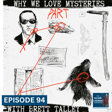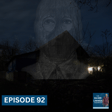Introduction and Case Background
00:00:00
Speaker
Hey everyone, we're a few weeks into the trial of Richard Allen for the 2017 murders of 13-year-old Abby Williams and 14-year-old Libby Germain.
Collaboration with Murder Sheet Podcast
00:00:11
Speaker
I wanted to share this conversation I had with Kevin Greenlee and Anya Cain of the Murder Sheet podcast as a bonus for everyone.
00:00:20
Speaker
Kevin and Anya have been leading the charge in coverage of the Delphi case, which has become yet another one of those situations where people on each side seem to be living in alternate realities.
Impact of True Crime Coverage
00:00:32
Speaker
This was released as a bonus short for our Patreon members in July, and it explores the human costs of the way true crime is covered today.
00:00:41
Speaker
We look at it through the lens of how media creators contribute to creating or solving the problem, regardless of where you stand on a particular issue, including any given true crime case. It seems as if much of our rhetoric today is not rooted in compassion, trying to understand the other person's perspective or truth.
Social Media and Confirmation Bias
00:01:01
Speaker
So many spaces like those in social media purport to be places of debate, but seem to have become spaces for confirmation bias or just podiums to yell your position or yell at those who disagree with you. This conversation is focused on coverage of high profile true crime cases that contribute to the problem. But I believe it's one that runs much deeper than the criminal justice system or what we call true crime. We see it everywhere.
00:01:29
Speaker
from so-called discussions about politics, the Israeli-Palestinian conflict, gender identity issues, the Russia-Ukraine war, or local school boards.
Consumer Influence on Media
00:01:40
Speaker
Content creators who grift off polarization are a key part of the problem.
00:01:45
Speaker
For content creators in any field, you can choose to not be a part of the problem. For subjects, you can focus your energy on credible creators. For listeners, viewers, and readers, you can make the most difference. You can turn your eyes and your ears away because they ultimately fund either progress or the problem.
Host's Personal Update and Content Promotion
00:02:08
Speaker
What we choose to listen to, read, view, and how we choose to discuss things is ultimately what's going to make the difference. Please forgive me for the raspiness in my voice in this bonus. I was coming off ah about with COVID-19, but I hope you enjoyed this conversation and check out our Patreon for more like it.
Interview on Ethical Concerns in True Crime
00:02:29
Speaker
Hey everyone, thank you for joining us in this Patreon only bonus episode with Kevin Greenlee and Anya Cain of The Murder Sheet. I asked him to come on to talk a little bit about some of the issues that we've run into, and not just as creators, but also as listeners, as people who get involved in cases and victim as family members. This is a brief discussion that we had on some of the human costs, the way that true crime is being able to
00:03:11
Speaker
So, hey, Kevin and Annette, I just really wanted to thank you for coming on for this brief episode.
Gratitude for Journalistic Discussions
00:03:19
Speaker
I've really enjoyed being on your podcast and feel like, um you know appreciate the fact that you guys have given me a voice to say impactful things about journalism and then the media that I really care deeply about.
00:03:32
Speaker
And then it's really been a pleasure to have you guys on for several episodes for us to be on together with Brett and um Alice and I really appreciate. You know, and not just your perspective that you bring, but that your values, you know, you guys are both very altruistic, caring people, you care about the truth.
Critique of Sensationalism in Media
00:03:54
Speaker
and you know And what sort of caused me to ask you to do this, I was watching an episode that you did with, I think it was Brett and Alice. And Ani, you made this comment about true crime swine. And after I stopped,
00:04:10
Speaker
I'm laughing. I just thought to myself, like, we've gotten to this place in criminal justice coverage and true crime coverage where they're really, you know, we've moved. And I think you put it perfectly when we were talking. We've moved from a, you know, like fights over ethics to even I think a fight over sanity. And and and I think that doesn't just apply to the the the cases themselves, but it also applies to what I would say is this insane disregard for all the human costs that are associated with it. Does that make sense to you guys?
00:04:53
Speaker
It absolutely does. And I just want to say, Jason, like we're huge fans of yours. It's been a huge pleasure to get to know you through true crime and become friends and everything. So we're we're thrilled to talk to you. I think about true crime swine, that's a sort of a made up character I kind of just conjured up to use as an example to talk about some of the more egregious behaviors.
Visiting Delphi and Personal Impact
00:05:13
Speaker
in um true crime creators like we've all seen kind of the sort of bottom feeding that can go on in terms of conspiracy theories abusive tactics and what was really frightening is that a couple of listeners reached out to us were asking like where can we watch true crime swine's videos like and they thought it was an actual person Yeah, I was describing this ludicrous kind of combination of all the worst behaviors. And unfortunately, people, we exist now in a realm where people were like, oh, yeah, I can imagine that existing. And it's like, oh, man, we're in a really bad place if that is true.
00:05:46
Speaker
Yeah, when this totally hyperbolic thing that we're talking about, people can imagine yeah it actually existing. When you think of those behaviors, you know thinking about that true crime swine character, what what is the amalgamation of those behaviors that you're seeing?
00:06:06
Speaker
I would say for me, there is a distinct lack of empathy. um ah Oftentimes that gets applied to the the murder victims themselves, the victim's family and loved ones, witnesses in the case, ah even maybe in some cases the defendant or the defendant's family or people who happen to just be in the wrong place at the wrong time and get involved in a case that you know, gets a lot of attention and then suddenly they're cast out as suspects or people to debate or speculate over. And there's just a real lack of regard for the human beings at the center of these cases, I think, from ah a true crime swine type creator.
00:06:46
Speaker
her Yeah. And one of the things that I've really thought about, like particularly when it comes to Delphi, and you guys know in April, because I met with you guys when I was there, I went to
Conspiracy Theories and Innocent Impact
00:06:57
Speaker
Delphi. um And going to Delphi for me was a very therapeutic experience to be able to see the site to visit the girls' graves, to like walk in the places that they they they walked. And it allowed me to kind of let go of being in the the middle of the details. And I'm not exactly sure. like I have a friend of mine who is more sure about that I was going there to heal. But one of the things that I think played a big role in that um
00:07:30
Speaker
was seeing you know one particular person that we both have interacted with on the case. He was connected to the leak work and you know him calling me up just emotionally broken, and then hearing the stories of what's happened in people's lives. and and I know some of these creators, your true crime swine point, know these things, but there seems to be this disregard for the human impact. I think about the Karen Weed case.
00:08:04
Speaker
like yeah I'll tell you my opinion, and like a 52 person conspiracy seems slightly unlikely. I think two people have a hard enough time conspiring with each other.
Fictional Treatment of True Crime
00:08:14
Speaker
But in this giant conspiracy that's been created and you guys talked to Julie Carpenter a bit about this, um and that was an amazing interview, ah there have been all these people who very clearly are innocent.
00:08:28
Speaker
who have been pulled in as potential suspects. And we see the same thing in Delphi, these potential suspects that don't really seem to be viable suspects. And I was thinking to myself, what is their lifelike? What is it like for their kids when they go to school?
00:08:47
Speaker
what is you know Are they getting attorneys emotionally? Like, do they sleep at night? And I feel like people either don't think about that or don't care about it. And that's frightening to me.
Family Accusations in High-Profile Cases
00:09:00
Speaker
to me, and i'll I'll let Kevin jump in here because I know he he's kind of, we talk about this a lot, sort of behind the scenes as well, but I think there's an element of treating true crime like it's a fictional story. When you're reading a fictional story about a murder and there's alternate suspects and red herrings, you know, that's part of the fun, right? Like, oh, maybe it's that guy, he was pretty sketchy. But when we're talking about real people, and we're just having conversations like that online,
00:09:23
Speaker
I don't think people think about it for like how would I feel if I went to the grocery store happen to see something and then suddenly I'm being portrayed as the possible villain and every aspect of my life is being combed over and my children are being harassed at school. We need to be able to drop ourselves in the middle of these things and think about it from alternate perspectives and that doesn't necessarily mean just kind of running with everything that one side puts out there. It means having a nuanced perspective. It means basically maybe it's not always worth it to just comment on everything and kind of keep, it especially kind of, frankly, silly conspiracy theories alive. And I think this tendency to try to be the one to identify the real killer gets
Gag Orders and Media Implications
00:10:09
Speaker
especially problematic when people start accusing family members.
00:10:15
Speaker
Yes, we we all know that in many cases, family members are responsible for ah crimes of violence. But we should also remember that in these cases, especially cases such as Delphi, which had been gone on for years, we can safely assume that the family was thoroughly investigated.
00:10:35
Speaker
And we can also assume that as much as you and I and all of the listeners care about the girls who were killed, and as much as we want justice for them, the family members want that even more. And it must be especially painful for them to hear people accusing them of being ah responsible for the death of two girls they love more than anything in the world. And I'll i'll just add this, Jason. you know One thing I always think about when when we're reporting on a case or when we're talking about a case with others is I just think back to this ah panel of a Peanuts cartoon where a Snoopy, I think, is reading a book titled something like
00:11:19
Speaker
You know, have you ever considered that you might be wrong? it's It's a joke about theology, right? And I think that's something that people really have to keep in mind for crime. We all could be wrong. You could be wrong. I could be wrong. And it's it's not i'm very often wrong. More times not.
00:11:36
Speaker
yeah I mean, we we get stuff wrong. Everyone everyone does. and Instead, you have people doubling down. You have people like, no, it must be this because this is what I think. and I think that's just the wrong way to come to a criminal case. I think we coming with more humility, coming with more like, here's what I think with caveats and I'm open to new evidence, I think that's a better place for us all to come from, from a consumer perspective. You know, also being willing to follow up and carry through the end of a story and to correct the record when you get something wrong. I think that's one of the the most important parts of
Responsible Media Consumption
00:12:13
Speaker
it. One of the things that you were saying, we were talking about the victims, families, um you know, Brett from the prosecutors had said, or I guess we had had lots of conversations about the idea that
00:12:25
Speaker
part of the reason why so many judges are issuing gag orders right now is they don't know what to do with this new media landscape with, let's call it the true crime swine landscape with YouTubers who are conspiracy theorists and other people who are sort of like going off the rails, so they're defaulting to what's not necessarily the most, what I would say, not the most, not in the spirit of the Constitution gag orders, but those gag orders are applying to the families like we see in Delphi or the University of Idaho killings. And that kind of takes the family's ability away
00:13:04
Speaker
from even though they may not be able to affect the case, it takes away their voice as all these creators are doing this. And I feel like it puts them in a very horrible vice because I don't know how you find peace in your grief when you're being accused of things or lies and conspiracies are going out there, but you can't you can't raise your voice to say anything.
00:13:34
Speaker
I think you're absolutely spot on. I'd go as far as calling some of these gag orders. like I mean, I don't know. I'm i'm a humble journalist, but i think I think they're unconstitutional. I think they're unnecessary. I don't think they do what judges think they're gonna do. I think when yourre talent when you're putting down a gag order, especially on family members,
00:13:51
Speaker
you are basically forcing the legitimate journalists from actual outlets from the field because they're not gonna just go out there and make stuff up. They need quotes from people who are actually involved. They're gonna walk away, and then all you have left is true crime swine. And guess what? He's gonna do a four-hour live picking apart some random cousin of the victim's Facebook. I mean, that's that's what he does. I mean, he he's not gonna leave, and frankly, that's all consumers are gonna be left with.
00:14:18
Speaker
um irresponsible nonsense. And so i really I really hope at some point some of these gag orders start getting smacked down or or other methods of dealing with this um are thought up with. I understand the necessity of preserving a case, but gagging family
Encouraging Ethical Content Choices
00:14:35
Speaker
members actually just makes the disinformation campaigns worse because there's no human element coming up and standing up and saying, this isn't true, um we should be able to defend ourselves, whatnot. It's just, it's a mess. It's really messy, Jason. i don't I don't know what the actual relief is here, but I just, I don't think it's a good trend. And I think judges are mistaken if they think this is gonna do anything but harm things and more. On some level, it makes me deeply uncomfortable
00:15:05
Speaker
that anya and i can speak out and say whatever we want about the richard alan murder case in delphi indiana for instance. and the family members of the victims are silenced. On some level, that just doesn't seem right. Why shouldn't they be allowed to have a voice on this? It affects them more than it affects anybody else. Yeah. One of the one of the conclusions I think I've come to over the last few months, ah or maybe even longer than that, is that while the creators who do these kinds of things, the true crime swine creators,
00:15:42
Speaker
um ah While they are responsible for their behaviors, it's really us as listeners. I was um i was talking, I forget who I was talking to. Oh, I was talking to Brad about this um on an episode that's coming up. And we were talking about how like every time we do an episode on missing murdered indigenous ah people, our download numbers like drop.
00:16:07
Speaker
um And we see these conspiracy theory people putting out their conspiracy theories and their numbers go up. It's not a matter of jealousy, but it it puts in stark relief that people vote with their eyeballs and they vote with their downloads. Is there something there to the idea that Jason, the creator needs to take responsibility for what he does on this podcast. But Jason, the listener also needs to take responsibility for what he consumes so it doesn't encourage bad behavior.
00:16:42
Speaker
Absolutely. i mean and And we've run into this a lot in Delphi. There's there's so many, frankly, true crime swine as creators out there. And we'll have people who are totally reasonable um say, well, we just watch them because it's funny, or it's a bit of a spectacle, or we want to see what crazy things they say next.
00:16:59
Speaker
And it's like there's no bucket for irony clicks. There's no bucket for spectacle clicks. All of that is just clicks, you know, that you're giving them attention. um Even in cases when they're not really fully monetized or they're too small to really make a living at it, you're giving them the attention they so obviously crave more than anything else in many cases. And I think we have to be willing to walk away when somebody crosses too many ethical boundaries or when someone's ah rhetoric. It's so abusive. I mean, in in Delphi, there's been heinous, horrible things said about the victims' families. There's been, um even on the other side of things, there's been people who say that if Richard Allen is acquitted, he should be harmed. I mean, it's it's totally out of control. Nobody should be paying attention to these people.
00:17:46
Speaker
And as as consumers, not only i I don't think it should just end with us not clicking on them, I think it should end and with us telling other people, hey, like you don't need to support that. That's actually just making things worse. like we can We can walk away from this nonsense and put the attention on creators who are trying, who are doing it right. I mean, nobody's perfect when it comes to this stuff, but there is a line that gets crossed.
00:18:11
Speaker
And when you give your clicks to something that you know is crazy or bizarre just because you find it funny or interesting to see, you're you're not just supporting that particular creator's insanity, you are also basically offering her roadmap to other creators who look like, this guy's getting really good numbers. If I want to get good numbers, here's what I should do. And so then you have people coming in and and imitating the crazy people and other people coming to imitate they are those crazy people. And it just is a spiral.
00:18:46
Speaker
It's a cottage industry. If you're willing to walk away and maybe take some others with you, it's actually an existential threat.
Personal Anecdote on Media Behavior
00:18:55
Speaker
One thing that we've been pestered with throughout Delphi is that frequently people would be like, did you see this? Did you see that? This guy said this crazy thing. No, we didn't see it because we don't pay attention to this stuff because it's actually garbage in, garbage out.
00:19:09
Speaker
If you're consuming stuff that's just nonsense, it's actually not helping your understanding of the case. It certainly doesn't help ours. We yeah right operate in the realm of reality here. Yeah. so my You'll love this. so My former partner, who may punch me for saying this, you know like any relationship you have here are hot moments. She would get like really upset and she's like, why are you not reacting? and I was like, well, because I don't reward bad behavior.
00:19:34
Speaker
i so through Which, let me tell you, drove her crazy. but um but But there is like, and it's very funny because now she's adopted that same approach and she quotes that line to people. um But the it's the idea like we don't want to reward ah bad behavior because it will, it sounds like you're saying it will only create more.
Obsessive Involvement in Conspiracies
00:19:59
Speaker
There's one sort of like, I wanted to wrap up with like one question about something that's not really explored. And I think some of this comes from the creators.
00:20:07
Speaker
But people become obsessed with these cases. They become obsessed with these conspiracy theories. You know, we look at the Karen Reed case and there's this creator named Turtle Boy who has actually harassed people to the point where he's been charged um in Delphi. We've seen like marriages fall apart and.
00:20:25
Speaker
you know, like threats against people. What do you think like the human cost for the people? And, you know, some of these people have mental health issues and other things like that. Some don't and may appear manipulative. And it's one of for me, it's like this sad thing that people don't see happening under the surface. um Is that something like that we can be more conscious of in some way?
00:20:53
Speaker
Yeah, I think I always find it helpful to think about this stuff like pollution, right? If you have, ah you know, a basically ah a town along a river, and some companies are starting to dump toxic chemicals into the river, you don't just end up with dead fish, you end up with dead birds that eat the fish, you end up with dead plants. um You have an ecological disaster. And if things get bad enough, you might even make the people of the town sick, ultimately, if they're Somehow getting some of these chemicals in through their water systems. It's it's it affects everything and so like
00:21:27
Speaker
I think basically looking at who is dumping the chemicals and what effect that has on people is is really, really important. And and sometimes it's actually, you know it can be self-harm. I think I've seen creators in Delphi ah blow up their lives over some of the issues that they get tangled up in this. And I think a lot of them end up thinking about it as proof that some conspiracy is out to get them. So you might actually be seeing some undiagnosed mental health problems there.
00:21:56
Speaker
But it's in fact like when people get really obsessive about dark stuff and kind of spiral into just fighting with other random people on the internet over that they're not really living their best life. They're not really living a happy life. And I would just encourage people if you're seeing someone go down that road, you know, truly logging off is ah ah a very good start to a healing process there and walk away because you have to wonder like,
00:22:22
Speaker
What are you adding to this case reality a lot of these people who have lost marriages or careers over this. They talk about how they have to do this because this is activism to bring the truth they're helping. And you're not you're not the end of the day richard alan's fate or what the defendant in whatever case you're looking at their fate is in the hands of their attorneys.
00:22:49
Speaker
And you you're not really affecting that.
Understanding Justice and Main Character Syndrome
00:22:52
Speaker
What you can do is your own life and or to preserve that and make it better. Yeah. the The main character syndrome that pervades throughout true crime really needs to end. It is it is not it is not not you should not want to be that directly involved. We should be taking the role of observers. Yep.
00:23:12
Speaker
it's not good to want to be in the center of things we've had incidents in delphi where you know somebody leaks something to us and then suddenly we're in the story that's not where we want to be it actually makes us very uncomfortable not ideal no right not ideal it's it's it actually is awful And um it's it's something where I think, though, other people see that and they see it as like, that's the goal. I want to, you know, team up with people and and do things and and have an impact. And and that's that's not how our system is supposed to work. It's not supposed to be some sort of, you know, pseudo American Idol. Everyone voted from home thing. It's supposed to be a court of law, ah rules of the jury, judges, rules of evidence. If we are calling ourselves true crime you know fans or whatever, listeners, then that's something that we should take very seriously and recognize that while there are flaws with our system, it is certainly better than some sort of trial by Twitter.
00:24:09
Speaker
Right. Right. Or trial in Russia.
Conclusion and Audience Appreciation
00:24:12
Speaker
um But I wanted to thank you guys both for doing this short. It's um you know ah a really cool thing that I've decided to give my listeners, and I just appreciate you being on one of our first ones. So thank you. And I'm sure we'll see each other soon. Thank you so much, Jason. We have such a great time always talking to you. And yeah, we're happy to be here. And and thanks so much to your listeners.
00:24:36
Speaker
Oh, thank you. They appreciate you, I know. This is Jason Blair and this is a Silver Lining Handbook Patreon bonus episode. We'll see you guys all soon.
Promotion of Vintage Villains Podcast
00:25:03
Speaker
Have you ever wanted to travel to the past and follow the trails of crooks, killers, and outlaws from yesteryear? All from the safety of a time machine? While on the Vintage Villains podcast, I examined the people, the cases, and the zeitgeist of the year in question, so we can learn what made folks tick back then and better understand that which plagues us in the overwhelming present. Subscribe to Vintage Villains now on your favorite music or podcatcher apps, and I'll be seeing you soon in another century.




















